Instructions for installing SQL Server 2017 step by step
SQL Server 2017 comes with new features in the installation process. It now supports the Machine Learning Service for R and Python. It also includes SSIS Scale Out Master and Scale Out Worker. It also includes extension options in PolyBase.
This article will explain to you how to install SQL Server step by step.
Begin
You can download the SQL Server 2017 installer at: https://www.microsoft.com/en-us/sql-server/sql-server-downloads-free-trial
- Please download SQL Server 2017 first version from Microsoft
You have 3 main options: Evaluation Trial (Test Evaluation), Developer edition (developer version) and Express edition (Express version).

The main question is which SQL Server version should you use?
- The version of SQL Server evaluation trial is a free version that includes all features. If you want to check any or all of the features, this is a perfect version. The trial period is 180 days, but you can purchase the Enterprise license or Standard License later. Please use this version if you plan to buy one of the two licenses later.
- The SQL Server Developer version is a free version, but you cannot use it in production. For this tutorial, you can use the SQL Server Developer edition. You should use it for development or training purposes. It also includes all the features you need.
- The SQL Server Express version is free and can be used in production, but it has a storage limit (10GB) and it does not include some features (such as SQL Server Agent, DTA, etc.). You should use this version if you don't need too much disk space or resources.
There are other versions like SQL Server Standard and Web version . They are cheaper than the Enterprise version . The Web version contains the features needed to work in a web hosting environment. The Standard version is the same as the Enterprise version, but there are some limitations such as Transparent Data Encryption (transparent data encryption), parallel partitions, mirrored backups, online indexing, etc. You should Check the features not included in this publication to see if it should be used.
For a complete list of differences between SQL Server versions, refer to the following link: https://docs.microsoft.com/en-us/sql/sql-server/editions-and-components- of-sql-server-2016? view = sql-server-2017
Install SQL Server 2017
After downloading, run the setup file of the SQL Server installer.Basic option will install mainly Database Engine with basic components. The article will use the Custom option to learn some other features available in SQL Server. Download Media will be installed later or installed in other machines:
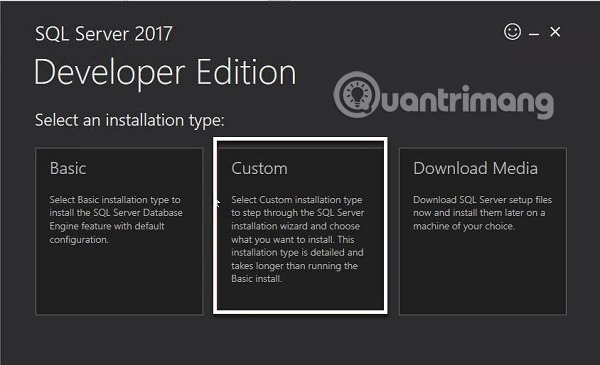
You can choose the installation location. It requires 9000MB of free space. Once selected, click Install:
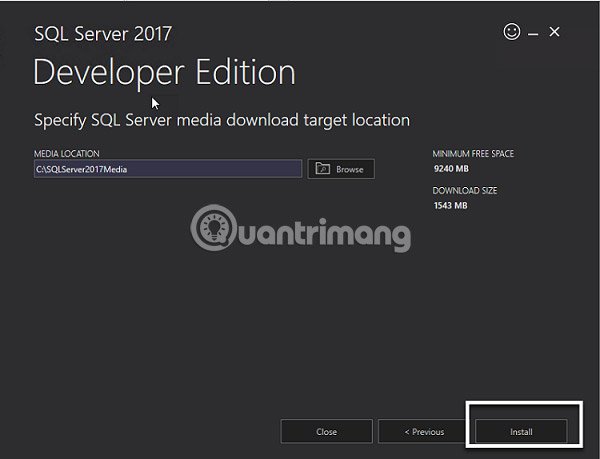
During installation, you will find useful URLs. For example, the following SQL Server forum where you will get useful advice:
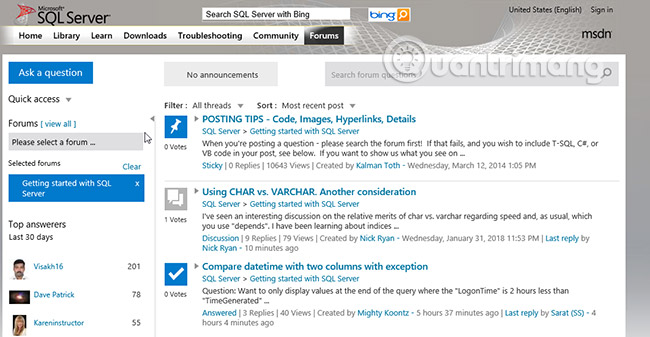
In addition, it will display GitHub containing sample database, sample code and many other things.

The installer will install in the Planning section . There are many useful resources here such as requirements for Hardware and Software to verify whether you meet all hardware and software requirements. You also have security documents, System Configuration Checker, Data Migration Assistant (DMA) - data migration tools, online installation documents, failover documents and upgrades grant:
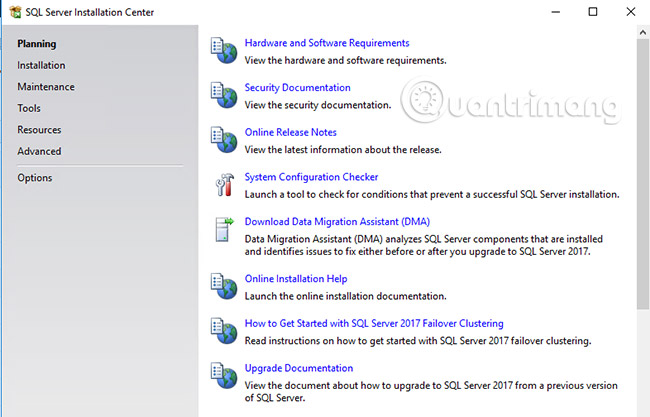
Go to Installation and select the New SQL Server stand-alone installation option . Note that SQL Server Reporting Services is installed separately:

In the software key, you can specify a license or choose a free version. In this example, the developer version will be installed:

License Terms will display the terms to install it. Please accept the license terms:

In Microsoft updates , you can verify if there are any updates in the installer:

The Install Rules will verify the Active Template Library, the registry keys, if the computer is not a domain controller:
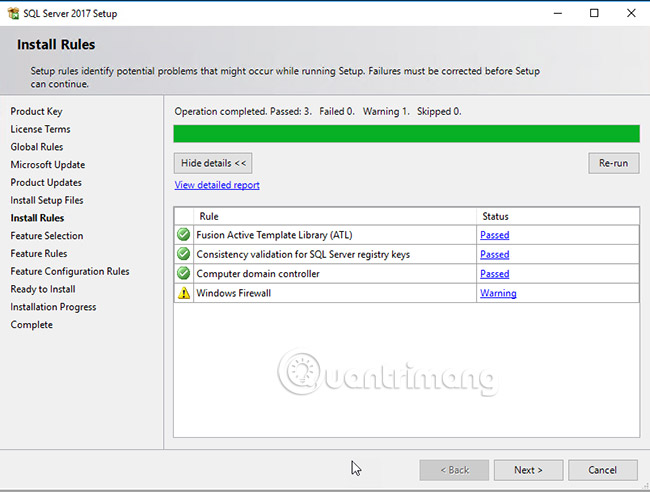
In Feature Selection , Data Engine Services is the database.
- Replication is useful if you want to copy your data in another server or another SQL Server version.
- Machine Learning Services (In-Database) : You can install R or Python. SQL Server 2016 includes the R Service. Now, you can have R and / or Python.
- Full-Text and Semantic Extractions for Search are used for full-text queries.
- Data Quality Services are used to enrich, standardize and avoid data duplication.
- Another interesting feature is PolyBase used to query NoSQL Data.
- Analysis Services is used in Business Intelligence (BI) to create shapes in Enterprise Reports with multidimensional technology:
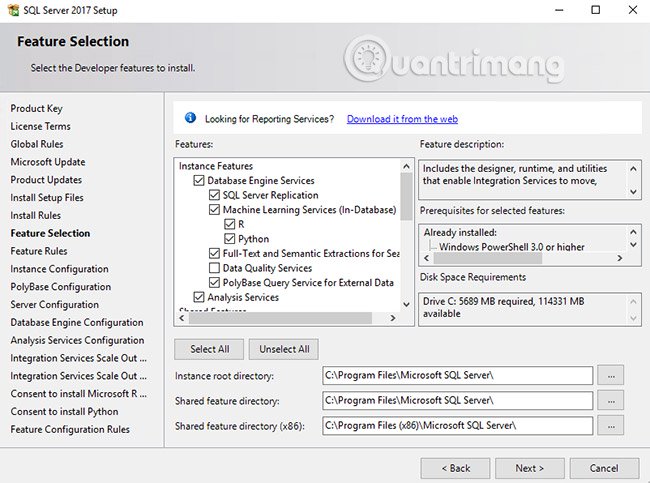
You have Machine Learning Services (In-Database) and Standalone. The first option is to install SQL Server Database Engine. Standalone does not require a database tool.
Data Quality Client aims to perform quality operations using independent tools. In Integration Services, we have the option to install Scale Out Master and Scale Out Worker. With this feature, you can distribute packages in different servers, for better performance. The Master is responsible for the activities and the Worker receives the tasks. Backward compatible client tools, including tools for working with older versions of SQL Server, such as unacceptable tools, interrupted tools, and groundbreaking changes in tools SQL tools.
Client tools SDK (client SDK tools) contains resources for programmers.
Distributed Replay Controller is a feature responsible for managing distributed Replay clients. Distribution Replay is used to monitor, verify performance, security, upgrade or test new environments, like SQL Profiler, but Distribution Replay can track multiple servers.
You can install Distributed Replay client to simulate the workload.
The SQL Client Connectivity SDK will install the SQL Server OLEBD and ODBC connectors, which can be used to connect to SQL Server using .NET, Java, PHP or other programming languages.
Finally, Master Data Services are used to organize your data into models, creating rules for accessing data and controlling who is using it:

If you choose PolyBase installation, setup will require Oracle JRE. You can get the JRE installer in the following link: http://www.oracle.com/technetwork/java/javase/downloads/jre8-downloads-2133155.html
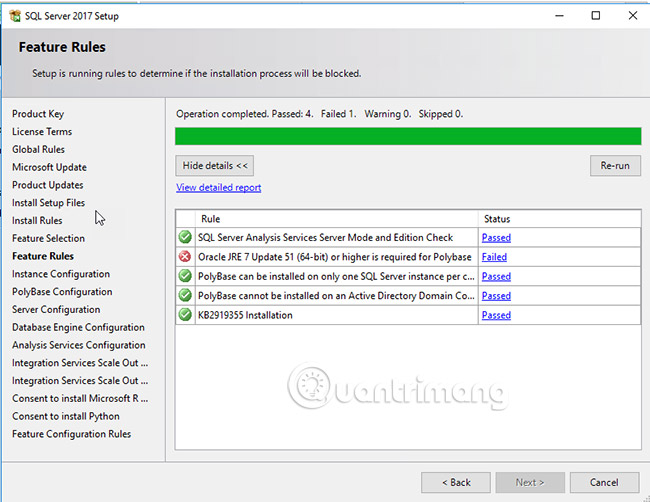
You can have multiple versions of SQL Server in SQL Server in the same server. This can be useful for simulating and practicing copying, mirroring or having individual instances for different purposes. By default, you can install the default instance which is usually the server's computer name:

In PolyBase, you can install as an independent instance or use a PolyBase scale-out group. PolyBase scale-out group is used when you need to query large data and you need to distribute the work on multiple versions of SQL Server. This option requires activating ports and enabling MSDTC:

There are automatically created account names for each service. You should remember these names. Do not grant admin permissions for these accounts unless there is no other option:

There are two options in SQL Server for authentication.Windows authentication will use Windows Account to authenticate in SQL. Mixed Mode allows creating internal logins and passwords within SQL Server. You can add an account here by using Add Current User or by clicking the Add button :
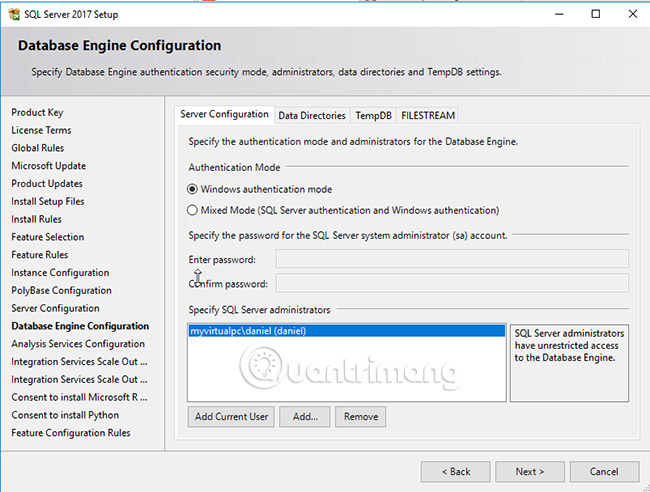
In the Data Directories tab, you can select the location for data files and log files. It's better to put them in separate drives to improve performance and enhance security for troubleshooting.
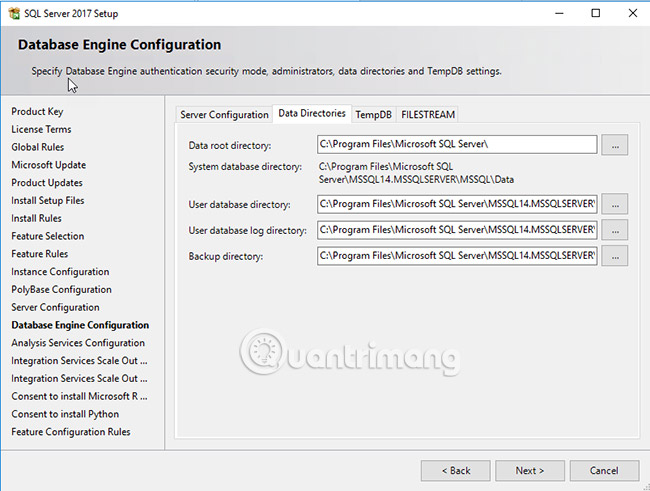
TempDB tab is used to configure TempDB database. This is the system table used to store data temporarily.
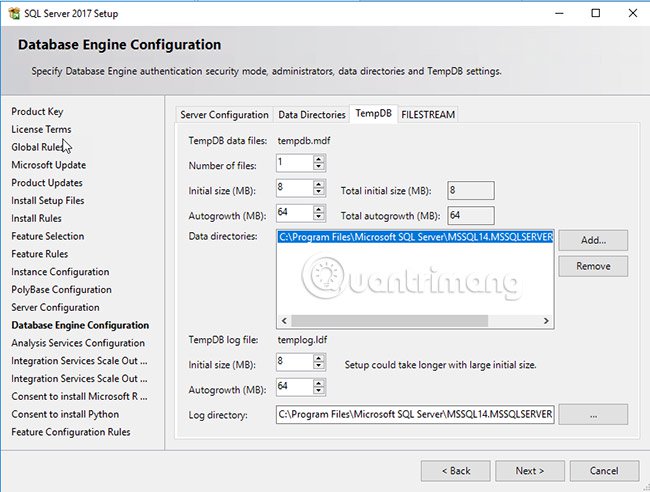
FILESTREAM allows storing unstructured data, such as documents and images in databases:
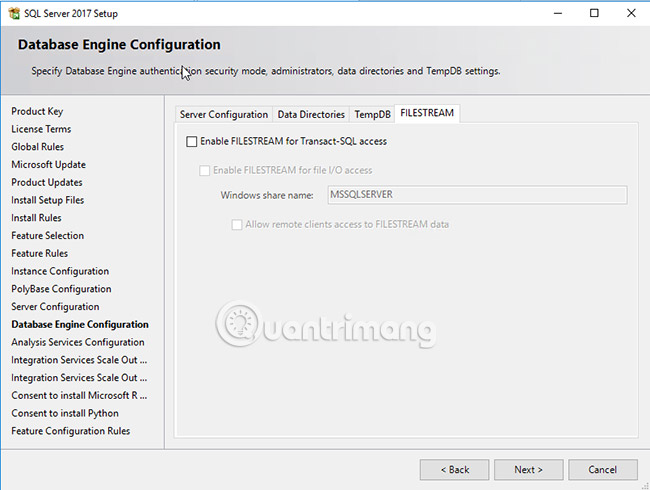
Analysis Services Configuration allows setting Multidimensional and Data Mining Mode (multidimensional data mining mode). This mode allows creating quick queries in enterprise reports. Another option is Install Tabular Mode. Tabular databases depend on RAM. If your database will be up to several TB in size, the Multi-dimensional option will be better. If you require Data Mining service, the Multidimensional option will be better.
PowerPivot can be used in Excel or if you can use it in SharePoint. PowerPivot for Excel can be used to create reports. If you need to share with many people, you can use SharePoint. You can add users with admin rights:
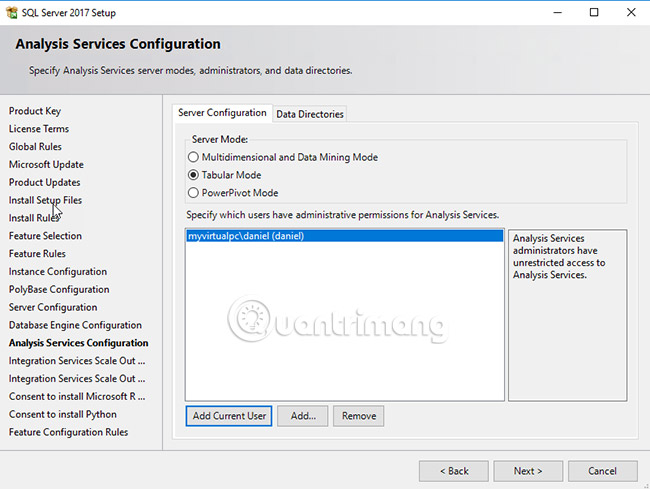
Integration Scale-Out Configuration - Master Mode will be used to determine the communication port between the primary and secondary nodes (master and worker). You will also be able to create a certificate here or use an existing certificate:
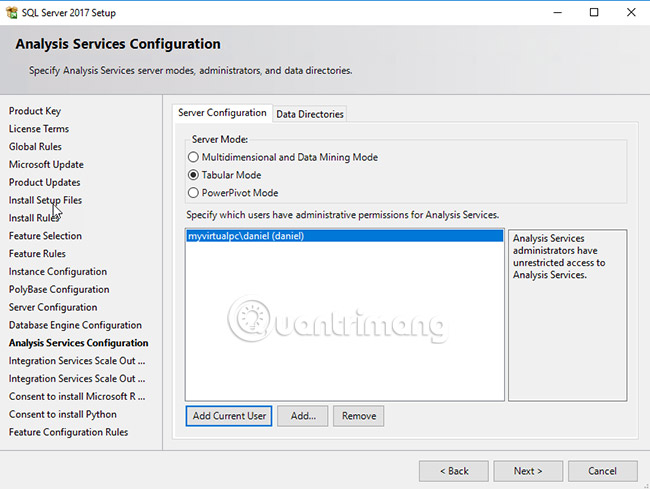
In Integration Services Scale Out Configuration - Worker Node , you need to specify the endpoint of Master Node, which is the name of the primary node and port. You can also specify an SSL certificate here:

You will receive a question if you want to install R. Click Accept and then click Next. R is a very popular language used for machine learning or for other purposes:
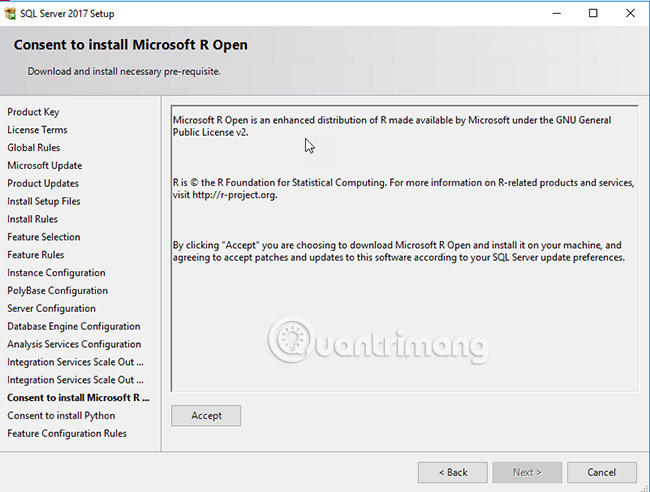
You can also accept Python installation as a competitor to R and provide many useful possibilities.

Once you've installed everything, you can verify the configuration. If everything is OK, click Install:
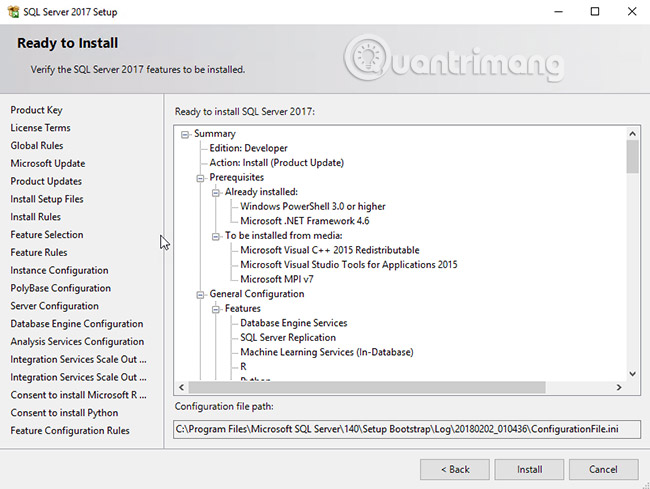
After 15-45 minutes, you will complete the installation of your database:
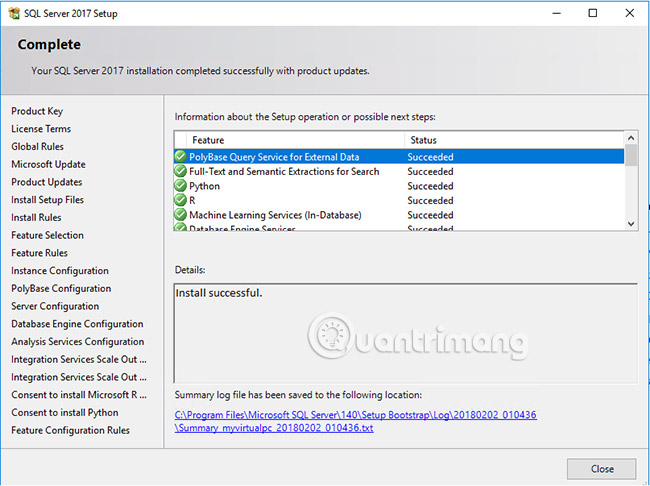
After installing the database and other components, open the installer. In the Installation section , select the option Install the SQL Server Management Tools:
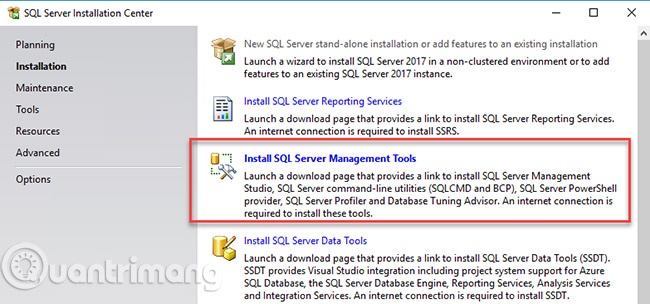
It will go to SSMS website, download the product:

After downloading, install the product:
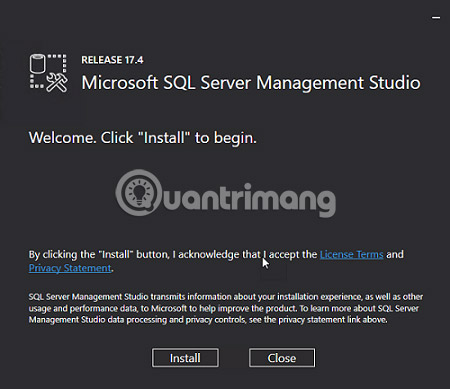
In the Windows menu, open Microsoft SQL Server Management Studio:
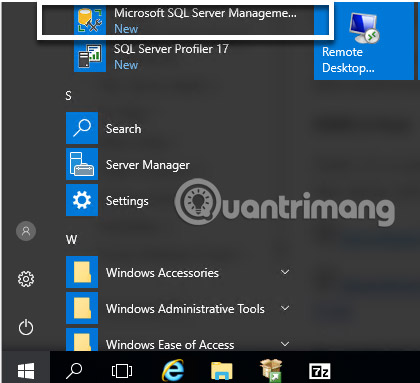
Select the SQL server name and click Connect:
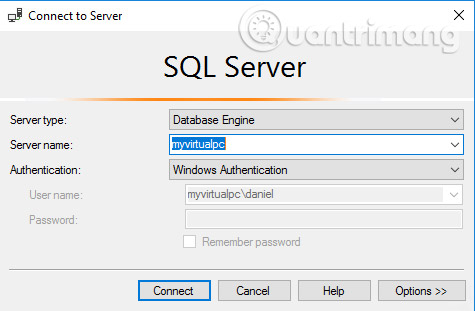
Select a database. Right-click and select New Query :
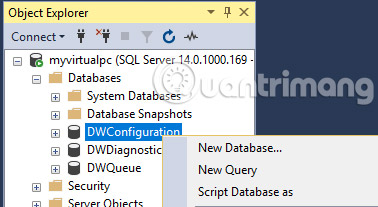
This example will run a system storage procedure.Sp_who will display sessions, connected users and processes:
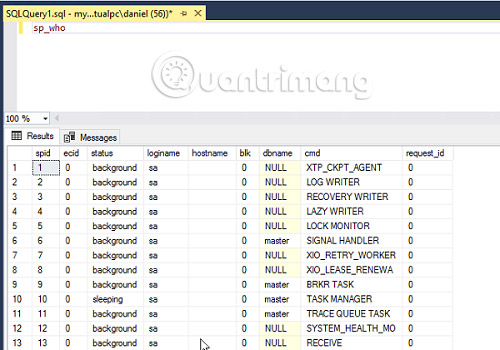
Another tool installed separately is SQL Server Data Tools. This tool will help you if you want to work with BI tools like SSAS, SSIS or SSRS:
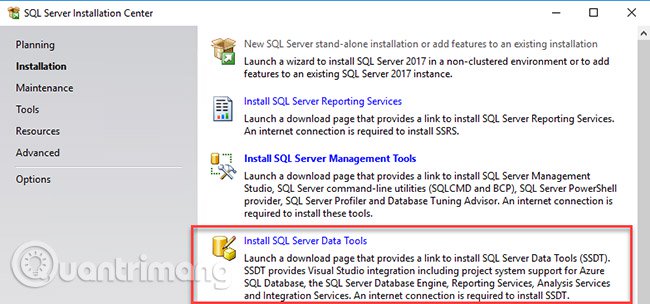
The link will take you to the SSDT website, where you can download the latest version:
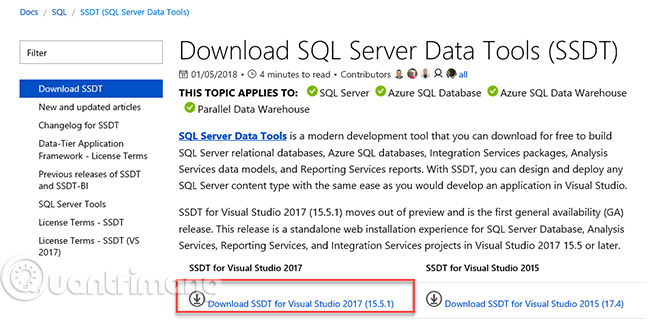
SQL Server 2017 comes with many new features like Python support, SSIS Master Scale Out, extra buttons. This article has shown you how to install SQL Server 2017 and learn about some new options and features. Hope you enjoy working with SQL Server 2017.
Good luck!
See more:
- Overview of SQL
- 5 good reasons to upgrade to SQL Server 2016
- Find Login in SQL Server